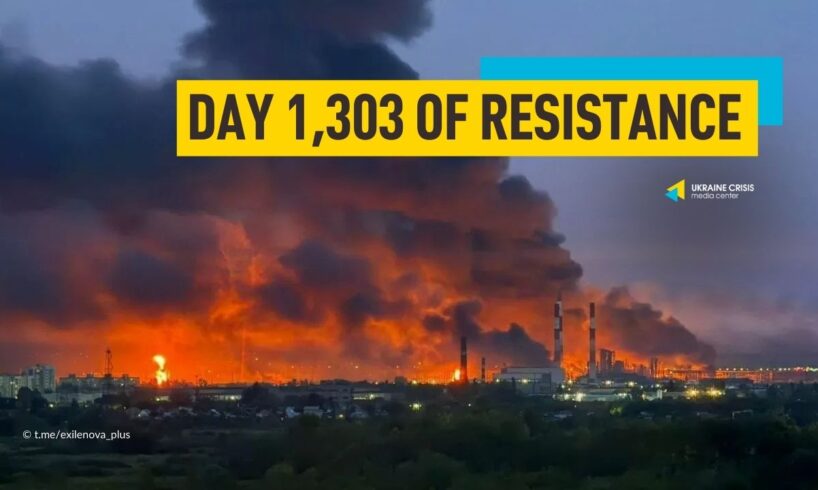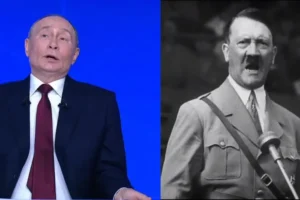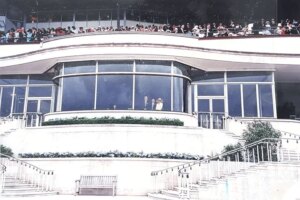
Russia’s Volgograd refinery halts operations after an overnight drone attack. The fuel shortage in Russia pushes prices higher. Russia aims for Ukraine’s capitulation, not peace talks, ISW says
Russia’s Volgograd refinery halts operations after overnight drone attack
An overnight Ukrainian drone attack hit a major oil refinery in Russia’s Volgograd on Thursday. The strikes were carried out by Ukraine’s Special Operations Forces. The facility has reportedly halted operations after the attack.
The Volgograd oil refinery is the largest fuel and lubricant producer in Russia’s southern federal district. It also supplies the Russian military, Ukraine’s Special Operations Forces said in a statement on Thursday.
The facility that is part of the Lukoil company has a capacity of 15.7 million tons and contributes 5.6 per cent to the country’s total output.
The Russian defense ministry said it had shot down 43 drones across the country overnight on Thursday.
After Ukrainian drone attacks in August, the refinery paused operations and stopped taking oil.
Fuel shortage in Russia pushes prices higher
Fuel shortage is intensifying in Russia following Ukrainian drone strikes on oil refineries. It is reaching the country’s central regions as fuel prices soar, The Moscow Times said on Tuesday, citing Reuters.
The fuel crisis has embraced at least 20 Russian regions, from Chukotka and Sakhalin to the Ryazan and Samara regions. Private gas stations stop selling gas, while the stations of oil companies are experiencing local shortages of some types of fuel, the article reads.
Wholesale gasoline prices on the St. Petersburg commodities exchange are on the rise, with the price of the popular Ai-92 grade reaching an all-time high of 73,144 rubles per metric ton on Tuesday. It climbed 1.9 per cent that day and 43 per cent since early this year.
The price of the Ai-95 grade reached 79,410 rubles per metric ton on Tuesday, staying below the record of 82,382 rubles per metric ton observed in August. The price climbed 0.9 per cent that day.
The gasoline situation was very bad and continued to deteriorate, one of the traders told Reuters, The Moscow Times said.
Ukrainian attacks on 10 plants disrupted at least 17 per cent of Russia’s refinery capacity, or 1.1 million barrels per day, according to Reuters calculations in August. One of Russia’s largest oil refineries, in the northwestern town of Kirishi, has halted a key processing unit following a Ukrainian drone attack over the weekend, two industry sources told Reuters on Monday. The unit accounts for almost 40 per cent of the plant’s total processing capacity of some 20 million metric tons per year, or 400,000 barrels per day.
Refineries in Ryazan, Saratov and Ufa were also attacked in September, The Moscow Times said.
Oil companies have sharply reduced bulk sales of fuel. Gas stations are running low on supplies and are forced to buy fuel at the commodity market, pushing the prices even higher, the report says.
Russia’s oil pipeline monopoly Transneft has warned producers they may have to cut output following Ukraine’s drone attacks on critical export ports and refineries, three industry sources told Reuters on Tuesday.
Russia aims for Ukraine’s capitulation, not peace talks, ISW says
Senior Russian officials continue to publicly signal the Kremlin’s unwillingness to engage in negotiations that result in anything less than full Ukrainian capitulation, the Institute for the Study of War (ISW) said in an update on Wednesday. The paragraphs below are quoted from the report.
Russian Foreign Minister Sergey Lavrov stated on September 17 that territorial exchanges will not “stop” Russia’s war in Ukraine, in contradiction to US President Donald Trump’s recent statements that peace between Russia and Ukraine will require “land swaps.”
Lavrov reiterated longstanding Kremlin demands that any future peace settlement eliminate the “root causes” of the war, which Kremlin officials have repeatedly defined as Ukraine’s alleged discrimination against Russian-speakers in Ukraine and NATO expansion, among other demands of both Ukraine and NATO. The Kremlin has often used this “root causes” phrase to call for the replacement of the current Ukrainian government with a Russian puppet government, Ukraine’s commitment to neutrality, and the revocation of NATO’s Open Door Policy. Kremlin Spokesperson Dmitry Peskov claimed on September 17 that Russia remains open to the negotiation process and that Russia’s “preferred solution” is a political and diplomatic settlement.
ISW continues to assess that Russia is uninterested in good-faith negotiations that will require Russian concessions and is willing to protract the war in order to achieve its original, maximalist war demands on the battlefield.
Senior Kremlin officials, likely with Russian President Vladimir Putin’s approval, pushed Kremlin Deputy Chief of Staff Dmitry Kozak out of his senior Kremlin position following years of disagreement with Putin’s policies about the war in Ukraine. Russian state media outlet RBK reported on September 17 that two familiar sources stated that Kozak “resigned” from his post over the weekend (September 13 to 14) and is considering various offers to move into business. Russian political scientist Arkady Dubnov similarly reported on September 17 that sources in Moscow stated that Kozak “voluntarily” left his position. Dubnov stated that Kozak was the only participant in the February 21, 2022, Security Council meeting who opposed the launch of the full-scale invasion of Ukraine. Russian journalist Alexey Venediktov confirmed Dubnov’s information on September 17. Kozak reportedly brokered a deal with Ukraine at the start of the war that would have prevented Ukrainian membership in NATO, but Putin reportedly rejected the deal since Putin also wanted to annex Ukrainian territory. The New York Times additionally reported on August 10 that Western and Russian sources indicated that Kozak lost his influence in the Kremlin after Kozak advised Putin in the past few months to immediately stop fighting in Ukraine, start peace negotiations, and reduce the power of Russia’s security services.
Kozak’s reported repeated disagreements with Putin suggest that Putin and possibly other Kremlin powerbrokers, such as Russian Presidential Administration Deputy Head Sergei Kiriyenko, removed Kozak from his position or pushed him to “resign” on his own. Putin signed a decree on August 29 abolishing the Presidential Administration’s Department for Interregional and Cultural Relations with Foreign Countries and Department for Cross-Border Cooperation, both of which Kozak supervised, likely in preparation for Kozak’s departure. The September 17 reports that Kozak is considering offers in business also refute previous reports from late August 2025 that Kozak was a candidate to become the Presidential Plenipotentiary Representative in the Northwestern Federal Okrug, suggesting that Putin may have decided in recent weeks to remove Kozak from the government entirely.
Kozak was previously one of Putin’s closest advisors and oversaw Kremlin strategy in Ukraine before the Kremlin shifted this responsibility to Kiriyenko in 2022. Kiriyenko has also reportedly recently taken over Kozak’s management of the Kremlin’s Moldova portfolio.
Kozak’s move out of the Kremlin will cement Kiriyenko’s power and responsibilities within the Presidential Administration. Putin’s likely decision to push an established senior Kremlin official from his inner circle after expressing a desire to end the war in Ukraine further indicates that Putin and his advisors are coalescing around their commitment to continue the war in Ukraine and around Putin’s maximalist war demands.





